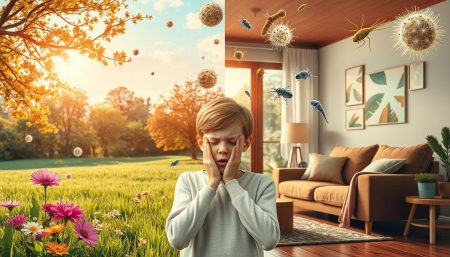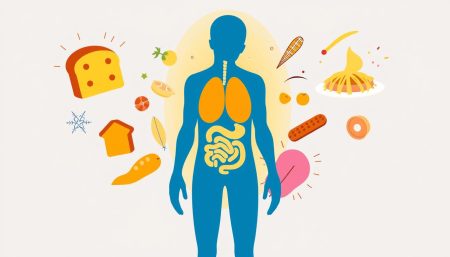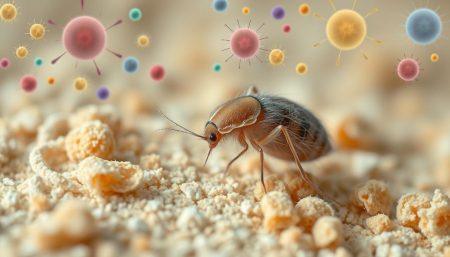What's Hot
- Understanding Metastatic Cancer and Treatment Options
- Understanding Lymphoma Cancer: Symptoms & Treatment
- Don Omar Cancer: Updates on Reggaeton Star’s Health
- Inflammatory Breast Cancer: Causes and Warning Signs
- Early Signs and Kidney Cancer Symptoms to Watch For
- Understanding Sarcoma Cancer: Types and Treatment Options
- Early Signs and Thyroid Cancer Symptoms to Watch For
- Early Signs and Symptoms of Colon Cancer to Know
Allergy
Peanut Allergy Symptoms: Know the Warning Signs
Every time we eat, we trust the food we choose. This trust is especially important for those with peanut allergies. In recent years, peanut allergies, especially in children, have become more common. Knowing the signs is key to staying safe…
Seasonal Allergy Symptoms: What You Need to Know
For many, spring and fall mean more than just a change in weather. They also bring seasonal allergy symptoms. These symptoms can really get in the way, affecting work and health. This article aims to help you understand and manage…
It’s crucial to know the warning signs of shellfish allergy to keep ourselves safe. Many people love eating seafood, but some might develop an allergy. Seafood allergies can affect anyone, at any age. Learning to recognize shellfish allergy symptoms is…
Alcohol Allergy Symptoms: Know the Warning Signs
Not all reactions to alcohol are just from too much drinking. For some, even a little can cause big problems. It’s key to know the alcohol allergy symptoms to get help fast. An alcohol allergy is rare but serious. This…
Dust mites are tiny but can cause big problems in our homes. They lead to symptoms of dust mite allergy that can really disrupt our lives. Knowing the signs is key to staying healthy and enjoying our daily routines. People…
Pollen Allergy Symptoms: Know the Warning Signs
When trees and flowers bloom, pollen allergy brings discomfort. For those sensitive to pollen, knowing the symptoms of pollen allergy is key. It’s not just about sneezes and sniffles. It’s about understanding the body’s response to pollen. Many overlook pollen…
Seeing sudden discomfort on your face can be scary and confusing. It makes you wonder what’s causing it. Face allergy symptoms are more than just minor annoyances. They disrupt your daily life and make you search for relief. This guide…
Dog Allergy Symptoms: Know the Warning Signs
Many people cherish the love of a furry friend. But, it’s important to know the signs of dog allergies for those who suffer. This guide aims to help you spot dog allergy symptoms and understand their effects. Dog allergies can…
Gluten Allergy Symptoms: Know the Warning Signs
Starting a journey to better health can be puzzling. Each symptom is a piece that doesn’t always fit. Gluten allergy is a common challenge that often goes unnoticed. It can make life uncomfortable and distressing. But, for those with unexplained…
Dust mites can cause a lot of discomfort and distress for many people. It’s important to understand dust mite allergies to take back control of our health. These tiny creatures live in our homes and can cause many dust mite…
Allergy
Allergy affects millions, making their immune systems fight off harmless substances. It’s like a silent warning that can turn everyday things into enemies. Spotting allergy symptoms early is key to finding allergy relief. This helps those with allergies live in a world full of potential allergens.
As the seasons change and our surroundings shift, learning about allergies is crucial. It’s not just about personal health; it’s a shared responsibility.
Understanding Allergies: Causes and Triggers
Allergies are complex, involving the immune system reacting to harmless substances. It’s about when the body sees these substances as threats, causing allergic reactions.
What is an Allergy?
An allergy happens when the immune system wrongly attacks a harmless substance, called an allergen. This leads to an immune response. The goal is to protect the body but ends up causing symptoms that can be mild or severe. These symptoms can disrupt daily life for many.
Common Types of Allergens
Allergens come in many forms, like pollen causing seasonal allergies. Pollen is a big problem in spring and fall. Other common allergens include dust mites, pet dander, and molds. Each one can cause different allergic reactions.
Genetic Factors and Environmental Influences
Genetics are key in allergies. If your parents have allergies, you might too. Environmental factors like pollution or climate change can make allergies worse. Together, they make allergies complex and affect how people react to allergens.
Allergy Symptoms and Diagnosis
Knowing allergy symptoms is key to managing allergies well. Symptoms like sneezing, itchy eyes, and runny nose can be annoying or serious. Severe symptoms include trouble breathing and anaphylaxis, which is very dangerous.
For a detailed look at allergy causes and symptoms, check out the Mayo Clinic.
Allergy testing is vital for finding out what allergies you have. Tests like skin-prick tests or blood tests show how your body reacts to allergens. These tests help doctors figure out the best treatment for you.
The aim of allergy testing is to find out what causes your allergic reactions. This helps create a plan to avoid those triggers and treat your symptoms. Knowing what allergens cause your symptoms helps you and your doctor find better ways to manage them.
Allergy Treatment and Management
Finding the right allergy treatment can make a big difference in daily life for those with allergies. The first step is to figure out what causes the symptoms. Over-the-counter antihistamines can quickly block the histamines that cause allergic reactions. Nasal sprays also help by reducing swelling and making it easier to breathe.
But these quick fixes are just part of the solution. They work best when used with a long-term management plan for common allergies.
Medical science has made big strides in treating allergies. Immunotherapy helps the body get used to allergens, making it less sensitive over time. This treatment comes in shots or tablets that dissolve under the tongue. It’s especially helpful for some types of allergies.
Changing your lifestyle can also help with allergy relief. Simple steps like using allergy-proof bedding and HEPA filters can reduce allergen exposure. Keeping your home clean is another way to lower your allergy risk.
What you eat also matters in managing common allergies. Some foods can trigger or help prevent allergic reactions. For example, omega-3 fatty acids can reduce inflammation. Finding the right diet can be tricky, but it’s part of a long-term plan.
Creating a personal allergy treatment plan is key. It should be tailored to your specific needs and lifestyle. Working with an allergist or healthcare provider can help make a plan that works for you.
FAQ
Q: What exactly is an allergy?
A: An allergy is when your immune system overreacts to harmless substances called allergens. When you meet an allergen, your body sees it as a threat. It then releases chemicals like histamines, causing allergy symptoms.
Q: What are the most common allergy symptoms?
A: Common symptoms include sneezing, itching, and a runny nose. You might also have watery or itchy eyes and rashes. In severe cases, allergies can cause breathing problems, swelling, and anaphylaxis, a life-threatening condition.
Q: Are allergies treatable and what are common forms of allergy relief?
A: Yes, allergies can be treated. Ways to find relief include avoiding allergens and using medications. You might also need nasal sprays or immunotherapy. The best treatment depends on your allergy’s severity and type.
Q: How can I find out what I am allergic to?
A: To discover your allergies, you can get tested. Tests like skin-prick tests or blood tests can identify allergens. A healthcare provider will suggest the best test for you.
Q: What are the common triggers for allergic reactions?
A: Common triggers include pollen, pet dander, dust mites, and mold. Insect stings, certain foods, and medications can also trigger reactions. Avoiding these can help manage symptoms.
Q: Can genetic factors influence allergies?
A: Yes, genetics can play a big role in allergies. If your parents have allergies, you’re more likely to have them too. But, your environment and exposure to allergens also matter.
Q: How do I manage allergies on a daily basis?
A: Daily management involves several steps. Watch pollen counts and keep windows closed during high-pollen times. Use air purifiers and wash linens in hot water to fight dust mites. Avoid foods that trigger allergies and take your medications as directed.
Q: Are seasonal allergies different from other types of allergies?
A: Seasonal allergies, or “hay fever,” are caused by outdoor allergens like pollen. They happen at specific times of the year. Other allergies, like food or pet allergies, can happen any time and are caused by different allergens.
Q: What treatment options exist for severe allergies?
A: Severe allergies can be treated with prescription medications and emergency epinephrine injections. Long-term treatments like allergy shots can also help by gradually making your immune system less reactive.
Q: Can allergies be cured?
A: There’s no cure for allergies, but symptoms can be managed. Immunotherapy can reduce symptoms over time and sometimes even lead to long-term relief after treatment stops.
Q: How can I prevent food allergy reactions?
A: To prevent food allergy reactions, read food labels carefully and watch for cross-contamination. Tell restaurants about your allergies and carry emergency medication like antihistamines or epinephrine auto-injectors if needed.
Q: What is the impact of environmental influences on allergies?
A: Pollution, climate change, and chemicals can worsen allergies by increasing allergen levels. Managing your environment is key to controlling symptoms.





















